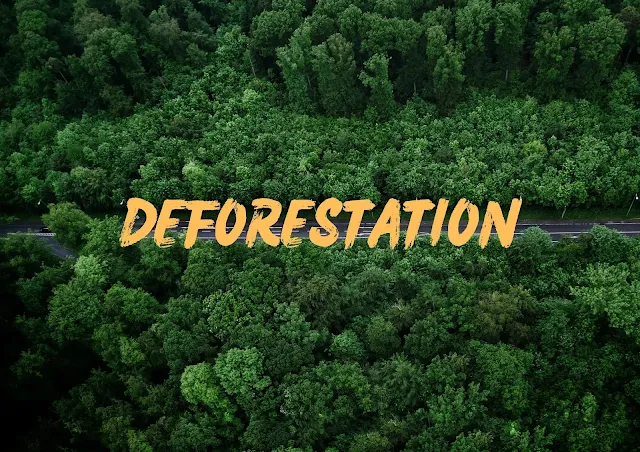Deforestation - Causes, Consequences, and Sustainable Solutions
Deforestation, the widespread clearance of forests by human activities, stands as a critical environmental issue with far-reaching implications for biodiversity, climate stability, and global sustainability. Understanding the root causes, comprehending its profound consequences, and exploring sustainable solutions are pivotal in addressing this pressing global challenge.
Understanding Deforestation
Deforestation refers to the deliberate removal of trees and forests, primarily for agricultural expansion, logging, infrastructure development, and urbanization. While some deforestation occurs naturally due to wildfires or disease outbreaks, human activities are overwhelmingly responsible for the accelerated pace of forest loss worldwide.
Causes of Deforestation
Several key drivers contribute to deforestation:
Agricultural Expansion: Clearing forests to make way for large-scale agriculture, including palm oil plantations, soybean cultivation, and cattle ranching.
Logging: Harvesting timber for construction, paper production, and furniture manufacturing.
Infrastructure Development: Building roads, dams, and urban areas often involves clearing large forested areas.
Mining: Extracting minerals and resources from beneath forested lands leads to habitat destruction and pollution.
Consequences of Deforestation
The impacts of deforestation are profound and multifaceted:
Loss of Biodiversity: Forests host a vast array of plant and animal species. Deforestation disrupts ecosystems, leading to habitat loss and endangering numerous species, some of which may be unique and endemic.
Climate Change: Trees act as carbon sinks, absorbing CO2 from the atmosphere. Deforestation releases stored carbon into the atmosphere, contributing significantly to greenhouse gas emissions and exacerbating global warming.
Soil Erosion: Tree roots help bind soil together. Without them, erosion increases, leading to degraded soil quality, reduced fertility, and increased risks of landslides.
Disruption of Water Cycles: Forests play a crucial role in regulating water cycles and maintaining local and regional climates. Deforestation can disrupt these cycles, leading to altered precipitation patterns and reduced water availability.
Social and Economic Impacts: Indigenous communities and local populations often depend on forests for their livelihoods, food, and medicinal resources. Deforestation can displace communities and undermine their cultural practices and economic stability.
Sustainable Solutions to Deforestation
Addressing deforestation requires a combination of policy interventions, sustainable land management practices, and global cooperation:
Forest Protection and Conservation: Establishing and enforcing protected areas and conservation reserves to safeguard biodiversity and ecosystem services.
Promoting Sustainable Agriculture: Encouraging practices such as agroforestry and organic farming that integrate tree cover with agricultural activities, reducing the need for large-scale forest clearance.
Legal Reforms and Governance: Strengthening laws and regulations to combat illegal logging and land grabbing, and promoting transparent and accountable land-use planning.
Supporting Indigenous and Local Communities: Recognizing and empowering indigenous peoples and local communities as stewards of forests, respecting their land rights, and integrating their traditional knowledge into conservation efforts.
Consumer Awareness and Corporate Responsibility: Encouraging consumers to choose sustainably sourced products and pressuring corporations to adopt responsible sourcing practices that do not contribute to deforestation.
Global Efforts and Initiatives
Internationally, organizations like the United Nations and initiatives such as REDD+ (Reducing Emissions from Deforestation and Forest Degradation) aim to promote sustainable forest management, reduce deforestation rates, and support forest-dependent communities.
Individual Action and Education
Individuals can contribute to combating deforestation by:
Supporting Conservation Organizations: Donating to or volunteering with organizations focused on forest conservation and restoration.
Making Informed Choices: Choosing products certified as sustainable (e.g., FSC-certified wood products, Rainforest Alliance-certified goods).
Advocating for Change: Raising awareness about deforestation issues in communities, schools, and through social media.
Deforestation poses a significant threat to global biodiversity, climate stability, and human well-being. Addressing this complex issue requires a holistic approach that balances environmental conservation with social and economic development. By implementing sustainable land-use practices, strengthening governance frameworks, and fostering international collaboration, we can mitigate the impacts of deforestation and secure a more resilient and sustainable future for generations to come.
As stewards of our planet, it is incumbent upon us to act decisively to protect and restore our forests, recognizing their invaluable role in supporting life on Earth. Through collective efforts and shared commitment, we can turn the tide against deforestation and preserve our natural heritage for future generations.
People Also Search For : Deforestation effects | Causes of deforestation | Deforestation example | Deforestation facts | Deforestation for kids | Deforestation solutions | What is deforestation short answer | Types of deforestation




Post a Comment
0Comments